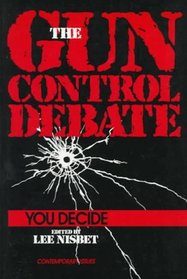Search -
The Gun Control Debate: You Decide (Contemporary Issues in Philosophy)
The Gun Control Debate You Decide - Contemporary Issues in Philosophy
At the end of the twentieth century and into the twenty-first, highly publicized gun massacres, especially in schools, have maintained "gun control" as a hotly contested, peculiarly American, political and cultural debate. Featuring selections from historians, criminologists, social scientists, public health specialists, and jurists, Dr. Nisbet... more »
At the end of the twentieth century and into the twenty-first, highly publicized gun massacres, especially in schools, have maintained "gun control" as a hotly contested, peculiarly American, political and cultural debate. Featuring selections from historians, criminologists, social scientists, public health specialists, and jurists, Dr. Nisbet... more »
ISBN-13: 9780879756185
ISBN-10: 0879756187
Publication Date: 2/1991
Pages: 341
Rating: ?
ISBN-10: 0879756187
Publication Date: 2/1991
Pages: 341
Rating: ?
0 stars, based on 0 rating
Genres:
- Nonfiction >> Current Events >> Poverty >> Social Services & Welfare
- Nonfiction >> Current Events >> Gun Control
- Politics & Social Sciences >> Crime & Criminals >> Criminology
- Nonfiction >> Philosophy >> General
- Nonfiction >> Politics >> General
- Nonfiction >> Social Sciences >> Sociology >> General
- Nonfiction >> Social Sciences >> Sociology >> Social Theory
- Law >> General
- Law >> Criminal Law >> Law Enforcement
- Law >> Constitutional Law >> General
- Law >> English Law >> Social Security & Welfare
- Engineering & Transportation >> Law >> Constitutional Law >> General
- Engineering & Transportation >> Law >> General




